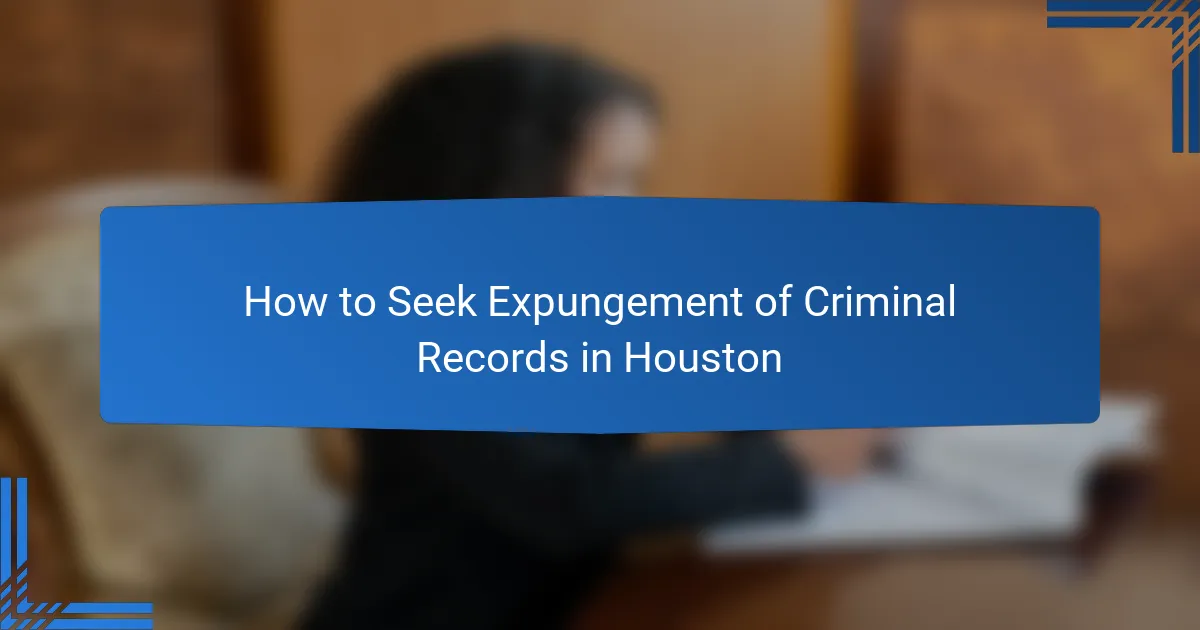Seeking expungement of criminal records in Houston can significantly improve your chances of securing employment and housing. The process involves consulting an attorney, filing a formal petition, and meeting specific eligibility criteria, such as completing your sentence and having no pending charges. By successfully expunging your record, you can remove the stigma of past offenses and move forward with a clean slate.
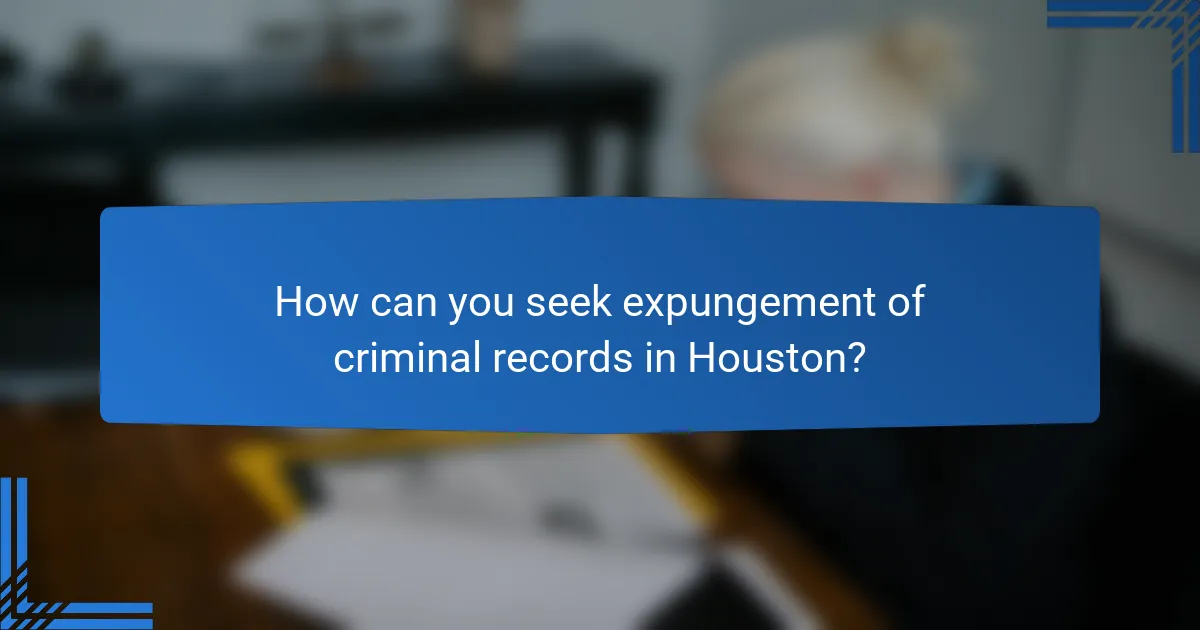
How can you seek expungement of criminal records in Houston?
To seek expungement of criminal records in Houston, you must follow a legal process that typically involves consulting an attorney and filing a formal petition. This process can help clear your record, making it easier to secure employment and housing opportunities.
Consult a criminal defense attorney
Engaging a criminal defense attorney is crucial for navigating the expungement process in Houston. An experienced lawyer can assess your eligibility based on the specifics of your case, including the nature of the offense and the time elapsed since the completion of your sentence.
During the consultation, the attorney will explain the requirements for expungement, which may include factors such as the type of crime and whether you have fulfilled all conditions of your sentence. They can also help gather necessary documentation and prepare you for any hearings.
File a petition for expungement
Once you have consulted with an attorney, the next step is to file a petition for expungement in the appropriate court. This petition must include details about your criminal record, the reasons for seeking expungement, and any supporting evidence.
After filing, the court will review your petition and may schedule a hearing. It is important to be prepared to present your case clearly and to respond to any objections from the prosecution. If granted, the expungement will effectively erase the criminal record from public view, allowing you to move forward without the burden of past offenses.
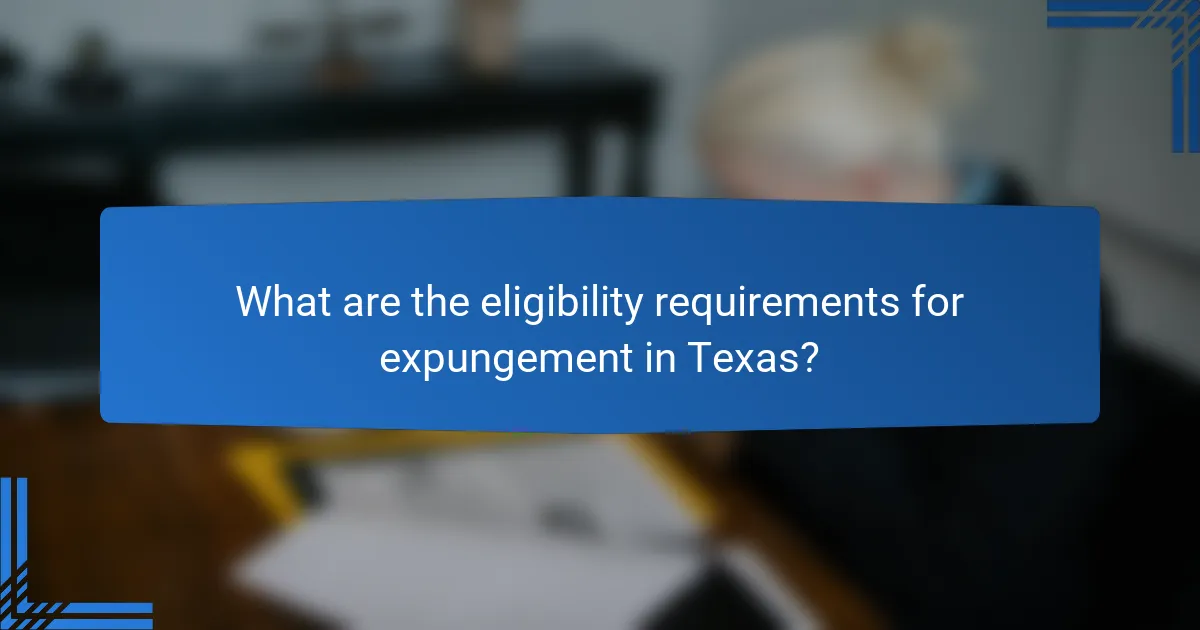
What are the eligibility requirements for expungement in Texas?
In Texas, to be eligible for expungement, an individual must have completed their sentence, including any probation, and must not have any pending criminal charges. Additionally, the offense must meet specific criteria, such as being a misdemeanor or certain felonies that are eligible for expungement under Texas law.
Type of offense matters
The type of offense significantly impacts eligibility for expungement in Texas. Generally, misdemeanors are more likely to be eligible than felonies. Certain felonies, such as those involving violent crimes or sexual offenses, are typically excluded from expungement, while non-violent offenses may qualify.
For example, Class C misdemeanors can often be expunged, while more serious charges like aggravated assault or sexual assault usually cannot. Understanding the specific classification of your offense is crucial when considering expungement.
Time since completion of sentence
Another key factor in seeking expungement is the time elapsed since the completion of your sentence. In Texas, individuals must wait a designated period after completing their sentence, including parole or probation, before applying for expungement. This period can vary depending on the type of offense.
For most misdemeanors, the waiting period is typically two years, while for certain felonies, it may be five years or more. It’s essential to ensure that you have fulfilled all conditions of your sentence before applying, as any pending charges can disqualify you from the process.
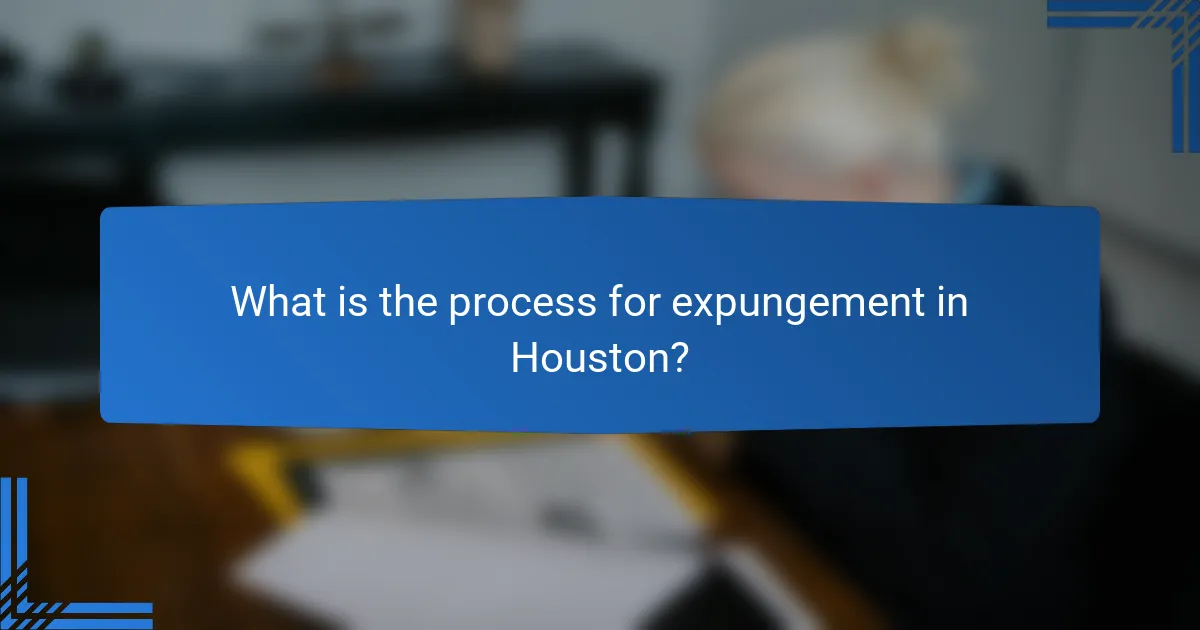
What is the process for expungement in Houston?
The expungement process in Houston involves legally removing a criminal record from public view, allowing individuals to move forward without the stigma of past offenses. This process typically requires gathering documentation, submitting a petition, and attending a court hearing.
Gather necessary documentation
To begin the expungement process, you must collect all relevant documentation related to your criminal case. This includes court records, arrest records, and any other legal documents that pertain to the offense you wish to expunge.
It’s essential to ensure that you have accurate and complete records, as incomplete documentation can lead to delays or denials. You may need to request these documents from various agencies, such as the police department or the court clerk’s office.
Submit the petition to the court
Once you have gathered the necessary documentation, the next step is to submit a petition for expungement to the appropriate court in Houston. This petition must include all relevant details about your case and the reasons for seeking expungement.
Be mindful of the filing fees associated with the petition, which can vary. Ensure that you follow the court’s specific guidelines for submission, as failure to do so may result in your petition being rejected.
Attend the court hearing
After submitting your petition, you will be scheduled for a court hearing where a judge will review your case. It is crucial to attend this hearing, as your presence can significantly impact the outcome of your petition.
During the hearing, be prepared to present your case clearly and answer any questions the judge may have. Having legal representation can be beneficial, as an attorney can help navigate the complexities of the legal process and advocate on your behalf.
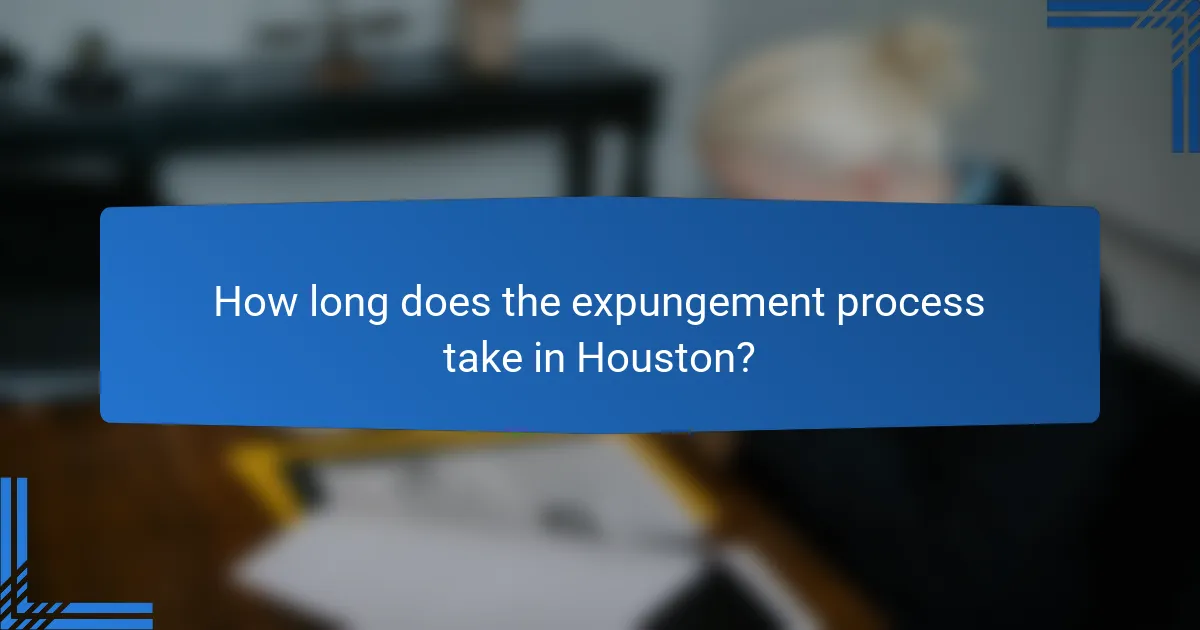
How long does the expungement process take in Houston?
The expungement process in Houston typically takes several months, depending on various factors. Generally, applicants can expect the entire process to range from six months to over a year.
Typical timeline for processing
The expungement timeline in Houston usually involves several key steps, including filing the petition, waiting for a hearing, and obtaining the court’s order. After filing, it may take around 30 to 90 days to receive a court date. Once the hearing occurs, the court may take additional weeks to issue a ruling.
After the ruling, it can take another few weeks to months for the expungement to be fully processed by law enforcement and other agencies. Overall, applicants should be prepared for a timeline that can extend from six months to a year or more.
Factors affecting duration
Additionally, the current workload of the court system and the efficiency of the agencies involved in processing expungements can vary, impacting how quickly the process moves forward. Being proactive in following up with the court and agencies can help mitigate some delays.
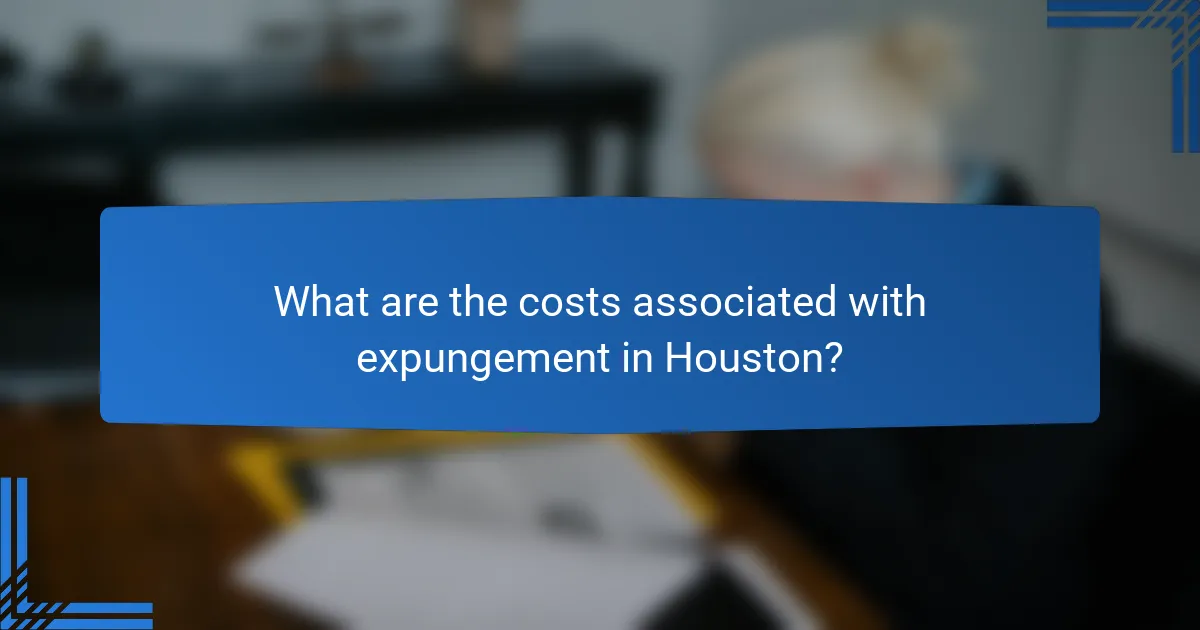
What are the costs associated with expungement in Houston?
The costs associated with expungement in Houston can vary significantly based on several factors, including attorney fees and court filing fees. Understanding these costs is essential for budgeting your expungement process effectively.
Attorney fees
Attorney fees for expungement in Houston typically range from a few hundred to a couple of thousand dollars, depending on the complexity of your case and the attorney’s experience. Many lawyers offer a flat fee for expungement services, which can simplify budgeting.
When selecting an attorney, consider their track record with expungements and any additional services they may provide. Some attorneys may charge hourly rates, which can lead to higher overall costs if the process takes longer than expected.
Court filing fees
Court filing fees for expungement in Houston generally fall between $200 and $400. This fee is paid to the court when you submit your expungement application and can vary based on the specific court handling your case.
It’s important to check with the local court for the most current fee schedule, as these fees can change. Additionally, if you cannot afford the filing fees, you may be eligible for a fee waiver based on your financial situation.
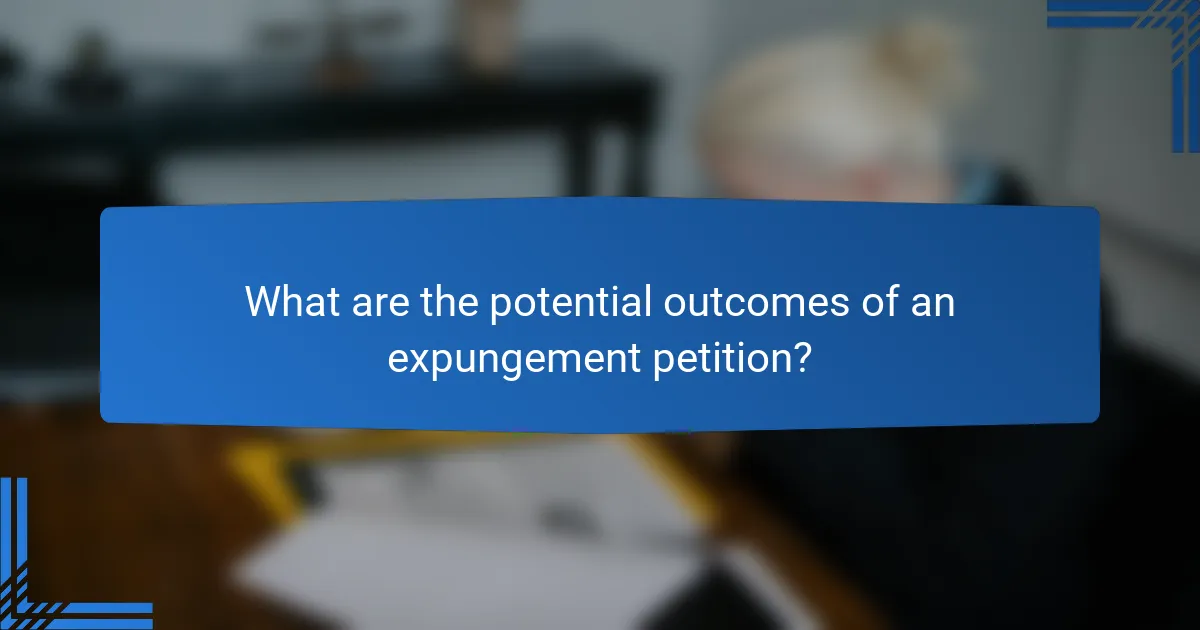
What are the potential outcomes of an expungement petition?
The potential outcomes of an expungement petition in Houston include either a granted or denied request. Understanding these outcomes helps individuals prepare for the next steps in the process.
Granted expungement
If an expungement petition is granted, the individual’s criminal record is effectively erased from public view. This outcome allows the person to legally deny the existence of the record, which can significantly enhance employment opportunities and personal reputation.
After a successful expungement, it is advisable to obtain certified copies of the expungement order and ensure that relevant agencies update their records accordingly. This may include local law enforcement, the Texas Department of Public Safety, and any other entities that may have access to the original record.
Denied expungement
A denied expungement means that the petition has not met the legal requirements set forth by Texas law. Common reasons for denial can include insufficient time elapsed since the conviction or the nature of the offense not qualifying for expungement.
If an expungement petition is denied, individuals have the option to appeal the decision or wait a designated period before reapplying. It’s crucial to consult with a legal professional to understand the specific reasons for denial and to strategize the best course of action moving forward.
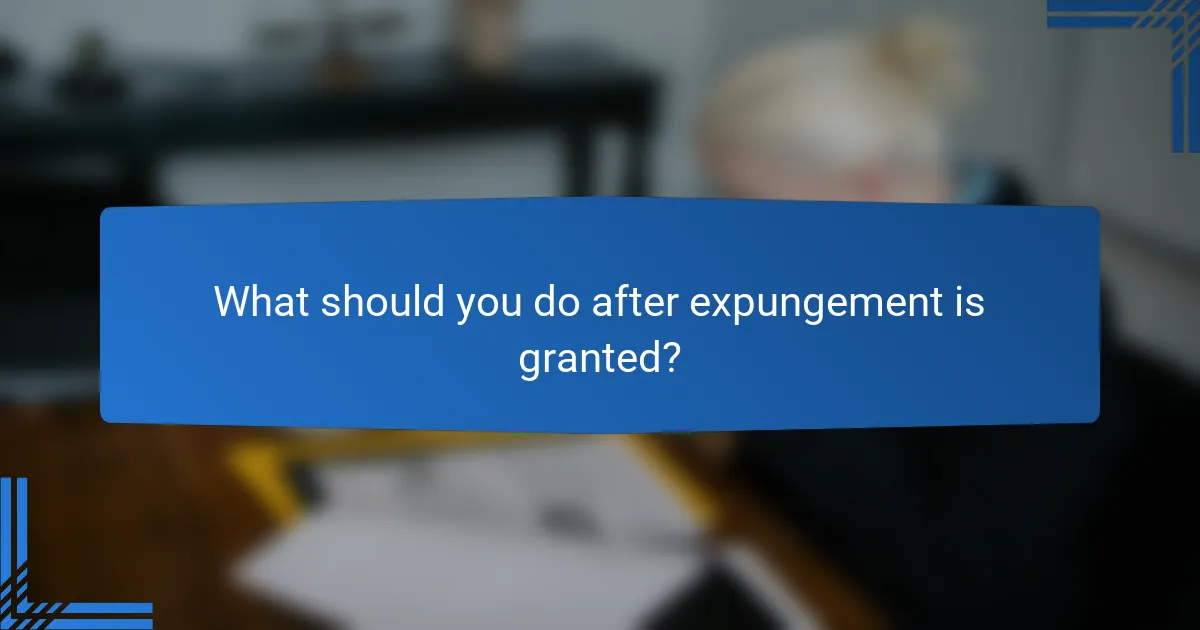
What should you do after expungement is granted?
After expungement is granted, it is crucial to take specific steps to ensure that your criminal record is effectively cleared from public view. This includes updating background check services and notifying relevant agencies to prevent any future complications.
Update background check services
Once your expungement is finalized, you should contact background check services to ensure they have updated their records. This may include companies that provide employment background checks, tenant screening, and other verification services.
Request confirmation that your expunged record has been removed from their databases. You may need to provide documentation of your expungement to facilitate this process.
Notify relevant agencies
It is essential to notify relevant agencies about your expungement to ensure that your record is cleared from all official databases. This includes local law enforcement, the court system, and any other agencies that may have your criminal record on file.
Consider sending a copy of your expungement order to these agencies, along with a cover letter requesting that they update their records. Keeping a record of all correspondence can help you track the status of your notifications.
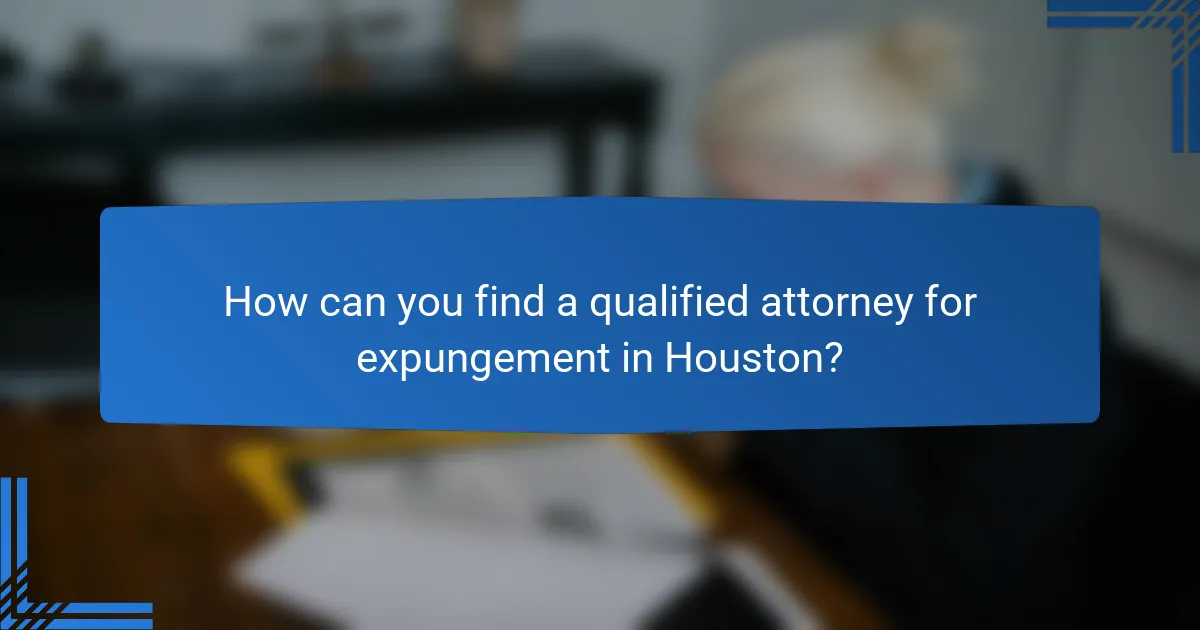
How can you find a qualified attorney for expungement in Houston?
To find a qualified attorney for expungement in Houston, start by looking for legal professionals who specialize in criminal law and have experience with expungement cases. Consider their reputation, client reviews, and success rates to ensure you choose someone who can effectively assist you.
Research local law firms
Begin your search by looking into law firms in Houston that focus on criminal defense and expungement services. Many firms will have dedicated sections on their websites detailing their expertise in handling expungement cases.
Check online reviews and ratings on platforms like Google, Avvo, or Yelp to gauge client satisfaction. You can also ask for recommendations from friends or family members who have gone through similar legal processes.
Once you have a list of potential attorneys, visit their websites to learn more about their qualifications, experience, and any initial consultation fees they may charge. This will help you narrow down your options to those who best meet your needs.
